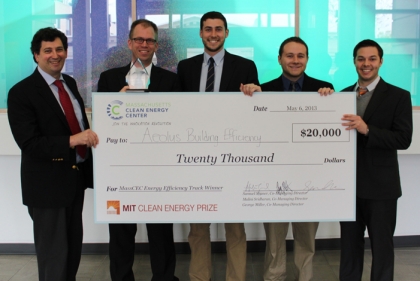BU Team Soars at MIT Clean Energy Competition
Wins First Prize in Energy Efficiency Category

A College of Engineering and School of Management team took first prize in the energy efficiency category of the annual MIT Clean Energy Prize on May 6, one of six premiere regional clean energy student business plan competitions in the U.S.
A collaboration between students and faculty from ENG and SMG, the team, Aeolus Building Efficiency, won $20,000 for its business plan and presentation for a full-service company that utilizes software to optimize airflow and reduce energy consumption in large office heating, ventilation and cooling (HVAC) systems. The technology could be a game-changer for today’s commercial buildings, which account for 18 percent of annual greenhouse gas emissions and 36 percent of national electric utility demand.
Consisting of senior Ryan Cruz, Associate Professor Michael Gevelber and former Professor Donald Wroblewski from the Mechanical Engineering Department, and MBA candidates David Cushman, Jonathan Ellermann and Benjamin Smith from SMG, Aeolus outperformed 15 other teams from nine states, including three semifinalists representing Harvard University, MIT and the University of Chicago.
Aeolus drew on ENG members’ expertise in building energy efficiency and HVAC systems optimization, and SMG members’ business development, operations, project management and sustainability experience. The team’s presentation impressed a panel of six judges from academia, government and industry who based their assessments on environmental benefit, creativity, execution and financial strategy, market and customer knowledge, and team strength.
Benjamin Smith (GSM’13) relished the opportunity to compete against outstanding teams and technologies from some of the nation’s top academic institutions. “Not only were we able to develop a comprehensive and compelling business plan, but the competition gave us an opportunity to substantiate that plan with cleantech industry leaders,” he observed. “It was an amazing experience.”
Taking part in the competition reinforced Ryan Cruz’s (ME’13) aspiration to pursue a career in the energy efficiency field. “I was able to learn more about the business side of engineering and aspects of building energy efficiency that I would not have normally been exposed to in the classroom,” he said.
“It was a great learning experience for all the team members, and we’re proud to get BU’s name recognized at such a highly competitive event,” said Gevelber (ME, MSE, SE). “We also had great mentoring from other BU faculty in both schools, and received support from BU’s Office of Technology Development, Institute for Technology, Entrepreneurship and Commercialization (ITEC) and Sustainable Neighborhood Lab.”
HVAC systems account for a large portion of energy use in mid- to large-sized buildings, and energy use and cost scales strongly with airflow. This is particularly true in older buildings designed when energy was much cheaper and HVAC systems were designed with high air flow rates. Based on concepts developed by Paul Gallagher (ME, MS’13) in his master’s thesis, Aeolus aims to commercialize its software-based service that enables room-by-room measurement and optimization of airflow rates, thereby reducing energy consumption while maintaining thermal comfort and meeting ventilation requirements.
Invented by Gevelber, Wroblewski and Gallagher and now being patented by BU, the breakthrough technology uses existing, computer-based building automation systems to reduce large building HVAC energy consumption by up to 20 percent without equipment installation, intensive manual labor or long payback periods.
“What’s amazing about our approach is that the system would take the same time to work on a building the size of Sargent College as it would for the Prudential Center,” Gevelber explained.
Formed in 2007 to help develop a new generation of energy entrepreneurs and companies and sponsored by NSTAR and the U.S. Department of Energy, the MIT Clean Energy Prize offers awards in three categories—renewable energy, infrastructure and resources, and energy efficiency. The competition’s $20,000 Energy Efficiency Track Prize is sponsored by the Massachusetts Clean Energy Center, which seeks to accelerate the success of clean energy technologies, companies and projects in the Commonwealth while creating high-quality jobs and long-term economic growth for the people of Massachusetts.